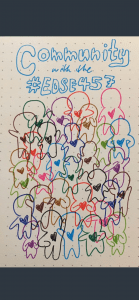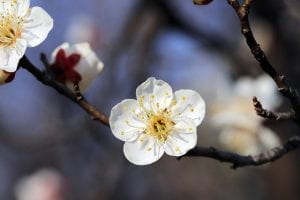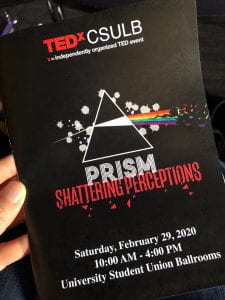
Today, I did a thing.
It was a huge thing, something that I never actually dreamed that I would be able to do.
Today, I gave a TEDx talk at the TEDxCSULB conference Prism: Shattering Perceptions.
If people are interested in the talk itself, I promise that I’ll post the video when it’s up on the TEDx site and that at the end of this blog post, I’ll post the text to the talk, which is somewhat different than how the talk came out on stage, but the message is essentially the same.
This blog, though, is about the process, and about the importance of community.
My talk was entitled “Learning from One Another” and truly, this experience has been about learning from everyone involved. Learning from my son, who encouraged me to apply, after I told him that there was a TEDx event at CSULB. I had applied to the inaugural TEDxCSULB conference and had not been selected so I was reticent to throw my ideas out there again. Maybe I didn’t have ideas worth spreading? Maybe my ideas were only interesting or important to me? Or maybe, I just wasn’t the right messenger for these ideas.
If anyone can make me overcome my self-doubt, it is my children. I always want to make the choices that I hope they will make in their futures if presented with an opportunity. So, I applied.
Then, the process was about learning, from the TEDxCSULB Executive Board and from my fellow speakers. TEDxCSULB is a completely student run conference, with support from the university and sponsors. The executive board team has been incredible every step of the way. Lorre (curator) and Jireh (assistant curator and MC) spent countless hours supporting each speaker through multiple drafts of their talk, rehearsals, coordinating logistics, and most importantly, building community. And Raymond (communications director) has been a complete light. We connected at the very first meeting and I’m so grateful for his love and support throughout this process. Meghan’s work on the social spaces and Mariah’s work with finance and support also kept everything on track. Although I didn’t get to work with Sumaiyah (and she’s not pictured below), I am so appreciative of her background work in organizing the logistics and operations. What an amazing team of incredible students who did this all on top of multiple job responsibilities, other leadership positions and schoolwork.

The Amazing TEDxCSULB Executive Board
I want to share one other thing that made me cry before the talk today. Jireh’s note to me began with these words, “Dear Betina, Seeing you, another outspoken passionate Asian American woman! fills me with so much joy and inspiration.” I can’t tell you what these words mean to me, but I hope that you know, Jireh, that these words fill me with so much joy and inspiration.
And then, my fellow speakers, each of whom were inspiring in so many ways — from their life stories and the adversities they have overcome, to their true passion for their topics, each one touched me. We truly developed such a deep bond in such a short number of encounters. Being around these passionate and caring individuals has truly made me a better person.
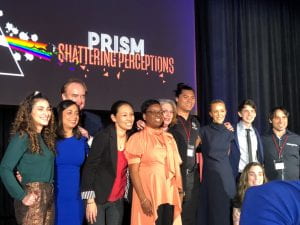
The TEDxCSULB Prism: Shattering Perceptions speakers
Special shoutout to my TEDxCSULB Bestie for Life, Amber, whose talk on asking better questions and whose amazing outfit were both incredibly inspiring. Thank you for literally being by my side since our very first meeting, in this process. I am grateful for the connection formed so quickly during this experience and know that we have a lifetime of encouragement and laughter together in our future. I am blessed to have met you.
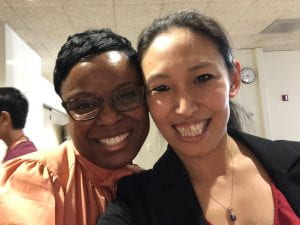
Amber & me <3 So grateful for her friendship and support
My friends, colleagues and current/ former students who came out to the event and who were thinking of me even when you couldn’t attend. Thank you. I am constantly learning from you. I am so grateful for you. My community truly sustains me. I love you so much and thank you for your deep love.
Tonight, I made my son proud. I made myself proud. I inspired people I care deeply for. Friends I’ve had for 20 years got to see me in a new light.
I am grateful tonight for contribution, the opportunity to make a difference.
The rest of this (very long) post will be the text to my TEDx talk as written.
And now, I can actually say: “Thanks for coming to my TEDx talk”
Learning from One Another: Lessons in (Educational) Excellence
It is 5am on the Thursday of finals week here at CSULB. It’s one of those mornings when you wake up already feeling exhausted from all the things that didn’t get done the day before. I reach over to my nightstand, pick up my phone to check my e-mail and see this message:
Dear Professor Hsieh,
I’m sorry for the late notice but I will be unable to complete this assignment by the due date. If you could please accept it, I would greatly appreciate it. Thank you for your understanding.
–Student X.
I put the phone down. I am so tired. My first thought in response to Student X is, “Thank you for your understanding? What understanding? Do YOU understand that I am trying to balance grading for the class you’re taking, studying for the class I’m taking, writing an article under a deadline, parenting two adults, a teenager and a preschooler, training for a half marathon, coordinating a church ministry and sometimes I have trouble remembering to eat and take a shower? I don’t have time for understanding or late papers! I’m barely making it to the end of the semester!”
I feel myself descending into a full-blown end-of-semester frenzy, but pause for just a moment to realize that, in my student’s own way, perhaps they are in exactly the same place.
I flash back to earlier in the semester when I had to e-mail my Chinese professor about missing class given a professional conference schedule not designed to accommodate a twice a week undergraduate language class. I think about times in the past when students have sent an e-mail like this then later come up to me privately in class or during office hours to tell me about a family or life circumstance that they just couldn’t explain in a three line e-mail. I think about my own children and their hesitance to approach their teachers to ask for extra support or a much needed extension because they were worried about what their teachers might think about them.
All these thoughts lead me finally to think about the rigors of education. [slide 2] When we think about a rigorous education, one that challenges students and holds them to high standards, often, we think only about academic success, demonstrated by success on a series of tests. We compare scores, pushing all students to strive for the impossible task of being “above the norm” without thinking about what the norm actually represents, who these students are, what they uniquely bring into the classroom space and what it means that we’re asking them to all conform to one narrow standard of greatness.
In our current society, we border on obsession with evaluating, ordering, and ranking people. We are driven by competition towards success that starts in school. Educators promise students that their working hard will lead to academic success will lead to career success will lead to life happiness. And, on the reverse side, there are powerful messages that if you test “far below basic,” you are somehow less likely to be successful and happy.
What are the costs and consequences of this view of educational excellence? Systemically, in schools and universities across the US and around the world, we’ve seen a narrowing of the curriculum, a focus on test-preparation and a system of tracking that set-ups educational haves and have nots, taking the joy and creativity away from learning. On an individual level, even students, teachers, and administrators who are “succeeding” within this system feel the constant pressure to continue performing. Being successful becomes like living in a never-ending hamster wheel that we can’t escape and that forces us to keep moving faster and faster. Those who struggle to “make the grade” are often pushed into “intervention classes” designed to help them think inside tiny bubbles and memorize rather than engage creatively.
Despite my own successes in this educational system, wondering about my own worthiness is something I struggle with daily: when I don’t understand a concept that I think should be simple for me, when I get an article rejected, when my 4-year old won’t listen to me, when I forget somewhere I was supposed to be or something I was supposed to pick on the way home. Every day, multiple times a day, I feel that I have to prove myself and that proving myself means constantly producing near perfect results, every single time. Even when I do all the things, I often wonder if they really equate to excellence. And if they do, is excellence worth how tired and stressed I feel at the end of the day?
I know it’s not just me. I was recently at my teenage son’s academic magnet school for a parent meeting. Students, who by all external measures are excellent, were asked to share anonymously what they wish their parents knew. “I wish my parents knew that I am trying my hardest. I wish they knew how much I worry about my academic performance in order to satisfy them.” “I wish my parents knew that the expectations and pressure they put on my grades continually crush me every day and that they appreciated how hard I work rather than dismissing my lack of an A through a punishment taking away everything that makes me happy.”
My students, too, share their struggles with me. Many of them are the first in their families to go to college and have potential to be incredible teachers and role models for their future students. They can design lesson plans and have sometimes spent years working in and out of schools with youth. [slide] Yet far too many are kept out of future classrooms because of high-stakes standardized assessments they struggle to pass. They are stressed, exhausted and overwhelmed trying to meet credentialing requirements that make observations feel like something to check off, rather than opportunities for learning.
No matter where you fall in the hierarchy of achievement, this standardized excellence causes each of us to lose much of our humanity to prove our worth. When our focus is on achievement to the exclusion of who people are and when achievement only is measured by right and wrong answers or the number of tasks completed, we limit our self-expression and our unique opportunities to contribute to our global society.
So, what if we had a different view of educational excellence and excellence in general? What if we transformed educational institutions to value the voices and contributions of every individual and if we began to view excellence as a collective, empowering process rather than an exhaustive list of individual achievements?
This is not a completely original idea. Nearly 50 years ago, Brazilian educational philosopher, Paolo Freire, envisioned education based on liberation, transformation and humanization, quite the opposite of our current standardized, competitive model. Freire defined humanization as the process of becoming transformative, and creative persons who participate in and with the world (1972, 1984).
To transform education and society according to this new model of excellence, we need a way to get there. In education, that way can be through what we call humanizing pedagogies, the idea that learning comes through new perspectives, gained through relationships between teachers and learners that acknowledge what we each bring to a particular learning space, with a consideration of our power and position in that learning context.
More simply, what I mean is this: educators and learners must develop strong relationships with one another, relationships where I can teach you in one moment, but you may teach me in the next. By knowing one another, we can see the rich resources that each of us contributes to various learning spaces. We can listen to and learn from one another.
But, while humanizing spaces should be reciprocal, they are still embedded within larger cultures and societies that give more power and less to others. We live in a society which simultaneously respects me more in certain situations because I hold a PhD and a title less in other situations because I am a woman and a mother. The way we talk, the things we say, the knowledge we have holds different weight based on our position in any given situation. If we are to transform our educational system and our society, we cannot simply say that we recognize the value in others’ contributions. We must act accordingly. When we have power, when we are seen as the authority, it is our responsibility to open the space to perspectives of those less often heard, to make room to encourage excellence.
Let me give you a recent example from my own classroom. Inspired by the activity I mentioned earlier at my son’s school, I asked my students what they wished that I knew about their experiences in the classroom. As the professor, I have power in this situation, so it was my responsibility to open the space for them to express their perspectives. Here’s one response I got: I wish Dr. Hsieh knew that Twitter and photographs make me uncomfortable.
My initial reaction was one of justification. I wanted to explain that I post photographs of my class on Twitter to make our learning public. I thought that if my student understood my reasoning, they would feel less discomfort, and agree with my choice. While that might or might not have been true, when I paused to listen to what my student was actually saying, it allowed me to think about whether posting pictures was actually necessary, if my goal was to make our practice public. I realized that I could still post w/o photographs, meet my goals and make a space that was more inclusive for my student. In shifting my practice, I opened the door to my student’s more active engagement, participation and investment in the course. It also opened the door for more excellence by creating a space in which we could both authentically focus on learning and development, on doing better by and for students while still working towards the same academic goals.
But humanizing practices don’t just open the door for more inclusive and excellent classroom spaces. They open doors to one another and to our own best selves. Let me give you some examples from outside of the classroom of places where humanizing conversations can make a difference.
If a good friend or beloved family member posts something we disagree with on social media, and we immediately fire back an angry response, business will go on as usual. But, if we work to engage this person, remembering and respecting who they are while challenging their perspectives, there is possibility for change. We don’t have to agree with them at the end of the day, but in taking away their humanity, we also lose our own. And in that loss, we lose a moment of possible transformation, a moment where we can begin breaking down the artificial walls that separate us from one another because we don’t see eye-to-eye. When we speak into the relationships that we have with others, finding points of mutual care and concern, remembering the ways that lives and perspectives are shaped by the contexts in which they’re embedded, we open the door to a better world. Our lives are more excellent when we can come together authentically instead of hiding from one another and isolating in our own echo chambers.
For my fellow parents in the audience, it’s never too early to learn excellence from our children. But we have to make the time to really listen. My 4-year old constantly calls me to be more excellent by reminding me to be more present, to play with her, to make time for impromptu dance parties, that storytelling is more than writing your b’s and d’s facing the right direction, that there is excellence in being who you truly are. And my 14-year-old reminds me that he’s going to be fine in life even if he doesn’t do every single leadership activity, and so am I. We’re both working on caring less about a predefined right path, and making the choices that we know are helping us to move towards greater excellence, even if others don’t quite understand those choices.
As someone who has done well in the traditional educational system and whose degrees and achievements afford me a great deal of respect, disentangling accomplishments as the measure of my worth has been hard. Having compassion for myself when I feel like I’m not doing enough or doing it right, in any area of my life, is a constant struggle.
But the struggle to reclaim excellence in my life is worth it.
I am clear now that my excellence cannot be measured by my productivity; by how quickly I get things or get things done, the degrees I have, or how many correct answers I have on a test. And your worth cannot truly be measured by these things either. In considering our own excellence, perhaps, we can begin instead to measure it in moments. Excellent moments spent in the car on the drive home from school listening to K-Pop with my son; reading my former students tweet about their students’ accomplishments in their classrooms; moments of growth and humanity in writing and rewriting this talk.
I’d like to invite you into this new journey towards excellence, one that asks you to see things differently but may also allow you to be more present to the human moments that make life beautiful. If you’ll join me on this journey, our final destination, in embracing our humanity in education, our relationships with one another, and our relationship with ourselves, will be a more a more fulfilling and loving world, a world in which more people are recognized, understood, and free. We can keep running on our hamster wheels and sharpening our number two pencils or we can collectively work towards a world of excellence and empowerment that moves us forward in ways we haven’t yet imagined. The choice is ours, together.


